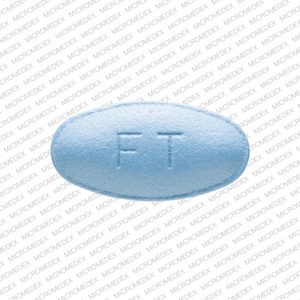Toviaz Side Effects
Generic name: fesoterodine
Medically reviewed by Drugs.com. Last updated on Jun 30, 2023.
Note: This document contains side effect information about fesoterodine. Some dosage forms listed on this page may not apply to the brand name Toviaz.
Applies to fesoterodine: oral tablet extended release.
Serious side effects of Toviaz
Along with its needed effects, fesoterodine (the active ingredient contained in Toviaz) may cause some unwanted effects. Although not all of these side effects may occur, if they do occur they may need medical attention.
Check with your doctor immediately if any of the following side effects occur while taking fesoterodine:
More common
- Difficulty having a bowel movement
- dry mouth
Less common
- Bladder pain
- bloating or swelling of the face, arms, hands, lower legs, or feet
- bloody or cloudy urine
- body aches or pain
- burning feeling while urinating
- chills
- cough
- decrease in frequency of urination
- decrease in urine volume
- difficult or painful urination
- difficulty in breathing
- difficulty in passing urine (dribbling)
- dry eyes
- ear congestion
- fever
- frequent urge to urinate
- headache
- loss of voice
- lower back or side pain
- rapid weight gain
- runny or stuffy nose
- sneezing
- sore throat
- tingling of the hands or feet
- unusual tiredness or weakness
- unusual weight gain or loss
Incidence not known
- Blurred vision
- fast, irregular, pounding, or racing heartbeat or pulse
Other side effects of Toviaz
Some side effects of fesoterodine may occur that usually do not need medical attention. These side effects may go away during treatment as your body adjusts to the medicine. Also, your health care professional may be able to tell you about ways to prevent or reduce some of these side effects.
Check with your health care professional if any of the following side effects continue or are bothersome or if you have any questions about them:
Less common
- Back pain
- belching
- dry throat
- heartburn
- indigestion
- nausea
- rash
- stomach discomfort, upset, or pain
- trouble sleeping
Incidence not known
- Dizziness
- itching skin
For Healthcare Professionals
Applies to fesoterodine: oral tablet extended release.
General
-Most frequently reported adverse events with a frequency of 4% or greater in adult patients with overactive bladder (OAB) were dry mouth and constipation.
-Most frequently reported adverse reactions with a frequency of 2% or great in pediatric patients with neurogenic detrusor overactivity (NDO) were diarrhea, urinary tract infection (UTI), dry mouth, constipation, abdominal pain, nausea, increased weight, and headache.[Ref]
Cardiovascular
Uncommon (0.1% to 1%): Tachycardia, palpitations
Postmarketing reports: Palpitations
Frequency not reported: Electrocardiogram QT corrected interval prolongation[Ref]
Dermatologic
Uncommon (0.1% to 1%): Rash, dry skin, pruritus
Rare (less than 0.1%): Angioedema, urticaria[Ref]
Gastrointestinal
Very common (10% or more): Dry mouth (34.6%)
Common (1% to 10%): Abdominal pain, diarrhea, dyspepsia, constipation, nausea, upper abdominal pain
Uncommon (0.1% to 1%): Abdominal discomfort, flatulence, gastroesophageal reflux
Frequency not reported: Diverticulitis, irritable bowel syndrome[Ref]
Genitourinary
Common (1% to 10%): Dysuria
Uncommon (0.1% to 1%): Urinary tract infection, urinary retention (e.g., feeling of residual urine, micturition disorder), urinary hesitation[Ref]
Hepatic
Uncommon (0.1% to 1%): Increased alanine aminotransferase (ALT), increased gamma glutamyltransferase (GGT)[Ref]
Hypersensitivity
Postmarketing reports: Hypersensitivity reactions (e.g., angioedema with airway obstruction, face edema)[Ref]
Immunologic
Common (1% to 10%): Infections[Ref]
Musculoskeletal
Common (1% to 10%): Back pain[Ref]
Nervous system
Common (1% to 10%): Dizziness, headache
Uncommon (0.1% to 1%): Dysgeusia, somnolence[Ref]
Ocular
Common (1% to 10%): Dry eye
Uncommon (0.1% to 1%): Blurred vision[Ref]
Other
Common (1% to 10%): Increased weight
Uncommon (0.1% to 1%): Peripheral edema, vertigo, fatigue[Ref]
Psychiatric
Common (1% to 10%): Insomnia
Rare (0.01% to 0.1%): Confusional state[Ref]
Respiratory
Common (1% to 10%): Dry throat, Upper respiratory tract infection
Uncommon (0.1% to 1%): Pharyngolaryngeal pain, cough, nasal dryness[Ref]
More about Toviaz (fesoterodine)
- Check interactions
- Compare alternatives
- Pricing & coupons
- Reviews (74)
- Drug images
- Dosage information
- During pregnancy
- Generic availability
- FDA approval history
- Drug class: urinary antispasmodics
- Breastfeeding
- En español
Patient resources
Professional resources
Related treatment guides
References
1. Product Information. Fesoterodine (fesoterodine). Aspire Pharma Ltd. 2023.
2. Cerner Multum, Inc. UK Summary of Product Characteristics.
3. Product Information. Toviaz (fesoterodine). Pfizer U.S. Pharmaceuticals Group. 2008.
Further information
Always consult your healthcare provider to ensure the information displayed on this page applies to your personal circumstances.
Some side effects may not be reported. You may report them to the FDA.

